Social-Emotional Learning Activities for After-School and Summer Programs
$21.95
Susanna Palomares
Here are the resources you need to keep kids engaged while helping them develop essential life skills. With these instantly usable and easy-to-implement activities you’ll create a thoroughly enjoyable experience for you and the children you work with. In this book you find meaningful ways to integrate art, music, movement, drama, and positive social interaction with valuable life skills and academic learning.
After-school and summer learning programs are the ideal venue for teaching social emotional skills such as caring for others, managing emotions, making wise and thoughtful decisions, developing positive friendships, and avoiding negative behaviors and influences. Social emotional learning (SEL) skills are important for all students but are especially necessary for at-risk students as a way to help close the achievement gap.
Research has shown that with direct instruction of social emotional learning experiences academic achievement goes up by 11%, and it works best for the kids who need it most! The teaching of reading, writing, listening, and the development of speaking skills are all integrated into these engaging SEL activities.
Use the creative activities you find here to enrich your program and develop an environment that allows your children to make the best possible progress in school and in life.
Activities will help your children to:
- Work collaboratively and considerately with others.
- Learn important aspects of communicating – listening, speaking, writing,
and reading.
- Value and respect individual differences.
- Manage difficult emotions.
- Learn refusal and resistance skills.
- Activate positive esteem and self-awareness.
- Develop a sense of belonging.
Introduction
Successful after-school and summer learning programs provide young people with fun, enriching, challenging experiences in safe and supportive, adult-supervised environments. Mounting evidence indicates that how and where children and youth spend their out-of-school time has profound effects on their development and safety. This has provoked increasing interest in, and support for, after-school and summer programs.
After-school and summer learning programs offer ideal venues for systematically developing critical life skills. Social-emotional learning (SEL) is based on sound theory and solid research and is designed to encourage positive personal, social, and ethical behavior in children and young people. Through effective SEL instruction, children learn to recognize, understand, and manage their emotions, understand and value others, create and work toward positive goals, make responsible decisions, and successfully manage interpersonal relations. After-school/summer learning programs provide a less structured and more relaxed environment than the regular classroom, where young people can experience engaging activities like games, role-play, art, music, and creative projects of all types.
With their active, yet focused, approach to skill development, after-school/summer learning programs have a significant role to play in preparing young people for the challenges and opportunities of the 21st century. We look to today’s youth to become the knowledgeable, responsible, and empathetic citizens and leaders of tomorrow. After-school/summer learning programs can greatly influence the realization of this future and are without question a worthwhile social investment with the potential for long-term positive impact.
Social-Emotional Learning and Academics
While SEL may seem like the warm, fuzzy side of education, a growing body of research shows that social and emotional competence boosts academic achievement. SEL is not just about better social functioning. It’s also about achieving academically. When children possess self-management skills, understand how to get along with others, and build positive relationships, they show improvement on virtually every behavioral measure, including cognitive development and academic performance.
Research also indicates that children with well developed SEL skills are better able to resist the perils of violence and crime, drug and alcohol abuse, depression, anxiety, eating disorders and teen pregnancy.
Social-Emotional skills are crucial to success in school, work and relationships and greatly affect quality of life. Young people who enter adulthood lacking social-emotional skills will be hard pressed to fulfill their potential and find success in personal, professional and civic life.
How This Book Will Serve You
The activities in this book are designed to encourage positive interaction among participating children, and between adults and children. Both engaging and challenging, the activities encourage initiative, decision-making, creativity, critical thinking, skill development, and talent sharing. Rather than a hit or miss approach, the book provides a coordinated and sequenced set of skill development activities. Areas of focused skill development include:
- awareness of feelings
- managing emotions
- making wise choices
- identifying positive qualities in self and others
- recognizing personal talents
- appreciating differences
- building a work/achievement ethic
- understanding body language
- sharing family traditions
- managing anger effectively
- taking responsibility
- respecting rules
- setting goals
- learning resistance/refusal skills
For optimal impact, after-school/summer learning programs need to devote sufficient time to activities that focus on social-emotional experiences and allow participating children to be actively involved. New skills are rarely acquired from a single experience. Meaningful learning requires multiple experiences, repeated focus and sufficient time. While this book provides complete directions for meaningful learning to occur, it’s up to you to follow through.
The activities in this book are designed to accommodate a wide range of learning styles. Most encourage active learning, or learning by doing. Lectures alone rarely produce growth and learning, but when young people get their bodies as well as their brains involved, much progress can be made toward mastery. This is truly a hands-on curriculum.
Grade 2-8, 108 pages, 8-1/2 x 11, paperback
Description
Susanna Palomares
Here are the resources you need to keep kids engaged while helping them develop essential life skills. With these instantly usable and easy-to-implement activities you’ll create a thoroughly enjoyable experience for you and the children you work with. In this book you find meaningful ways to integrate art, music, movement, drama, and positive social interaction with valuable life skills and academic learning.
After-school and summer learning programs are the ideal venue for teaching social emotional skills such as caring for others, managing emotions, making wise and thoughtful decisions, developing positive friendships, and avoiding negative behaviors and influences. Social emotional learning (SEL) skills are important for all students but are especially necessary for at-risk students as a way to help close the achievement gap.
Research has shown that with direct instruction of social emotional learning experiences academic achievement goes up by 11%, and it works best for the kids who need it most! The teaching of reading, writing, listening, and the development of speaking skills are all integrated into these engaging SEL activities.
Use the creative activities you find here to enrich your program and develop an environment that allows your children to make the best possible progress in school and in life.
Activities will help your children to:
- Work collaboratively and considerately with others.
- Learn important aspects of communicating – listening, speaking, writing,
and reading.
- Value and respect individual differences.
- Manage difficult emotions.
- Learn refusal and resistance skills.
- Activate positive esteem and self-awareness.
- Develop a sense of belonging.
Introduction
Successful after-school and summer learning programs provide young people with fun, enriching, challenging experiences in safe and supportive, adult-supervised environments. Mounting evidence indicates that how and where children and youth spend their out-of-school time has profound effects on their development and safety. This has provoked increasing interest in, and support for, after-school and summer programs.
After-school and summer learning programs offer ideal venues for systematically developing critical life skills. Social-emotional learning (SEL) is based on sound theory and solid research and is designed to encourage positive personal, social, and ethical behavior in children and young people. Through effective SEL instruction, children learn to recognize, understand, and manage their emotions, understand and value others, create and work toward positive goals, make responsible decisions, and successfully manage interpersonal relations. After-school/summer learning programs provide a less structured and more relaxed environment than the regular classroom, where young people can experience engaging activities like games, role-play, art, music, and creative projects of all types.
With their active, yet focused, approach to skill development, after-school/summer learning programs have a significant role to play in preparing young people for the challenges and opportunities of the 21st century. We look to today’s youth to become the knowledgeable, responsible, and empathetic citizens and leaders of tomorrow. After-school/summer learning programs can greatly influence the realization of this future and are without question a worthwhile social investment with the potential for long-term positive impact.
Social-Emotional Learning and Academics
While SEL may seem like the warm, fuzzy side of education, a growing body of research shows that social and emotional competence boosts academic achievement. SEL is not just about better social functioning. It’s also about achieving academically. When children possess self-management skills, understand how to get along with others, and build positive relationships, they show improvement on virtually every behavioral measure, including cognitive development and academic performance.
Research also indicates that children with well developed SEL skills are better able to resist the perils of violence and crime, drug and alcohol abuse, depression, anxiety, eating disorders and teen pregnancy.
Social-Emotional skills are crucial to success in school, work and relationships and greatly affect quality of life. Young people who enter adulthood lacking social-emotional skills will be hard pressed to fulfill their potential and find success in personal, professional and civic life.
How This Book Will Serve You
The activities in this book are designed to encourage positive interaction among participating children, and between adults and children. Both engaging and challenging, the activities encourage initiative, decision-making, creativity, critical thinking, skill development, and talent sharing. Rather than a hit or miss approach, the book provides a coordinated and sequenced set of skill development activities. Areas of focused skill development include:
- awareness of feelings
- managing emotions
- making wise choices
- identifying positive qualities in self and others
- recognizing personal talents
- appreciating differences
- building a work/achievement ethic
- understanding body language
- sharing family traditions
- managing anger effectively
- taking responsibility
- respecting rules
- setting goals
- learning resistance/refusal skills
For optimal impact, after-school/summer learning programs need to devote sufficient time to activities that focus on social-emotional experiences and allow participating children to be actively involved. New skills are rarely acquired from a single experience. Meaningful learning requires multiple experiences, repeated focus and sufficient time. While this book provides complete directions for meaningful learning to occur, it’s up to you to follow through.
The activities in this book are designed to accommodate a wide range of learning styles. Most encourage active learning, or learning by doing. Lectures alone rarely produce growth and learning, but when young people get their bodies as well as their brains involved, much progress can be made toward mastery. This is truly a hands-on curriculum.
Grade 2-8, 108 pages, 8-1/2 x 11, paperback

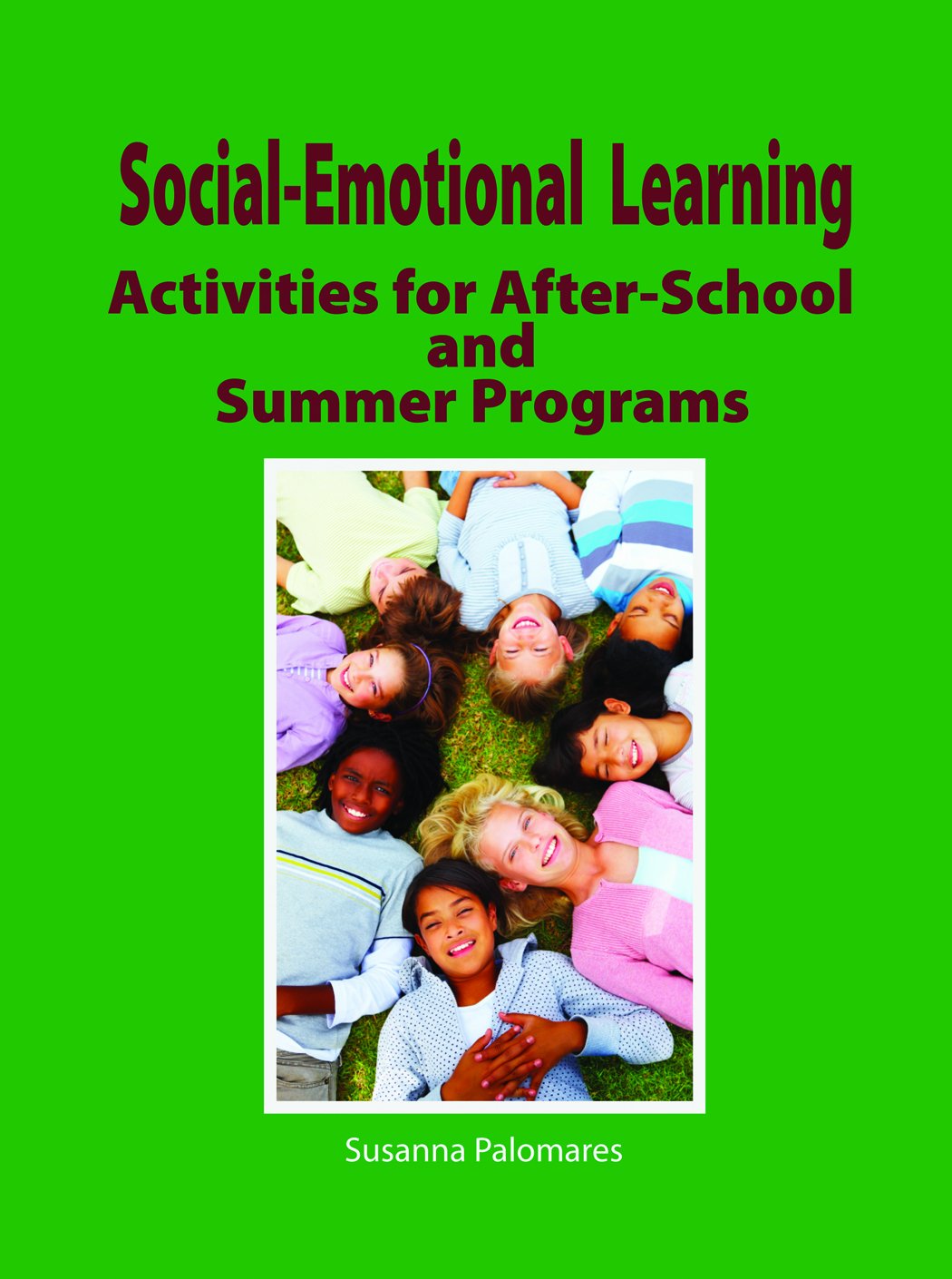
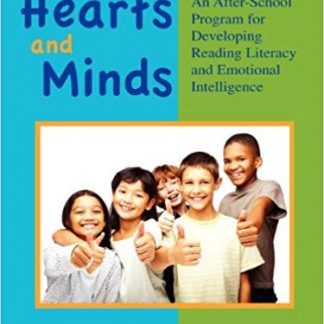
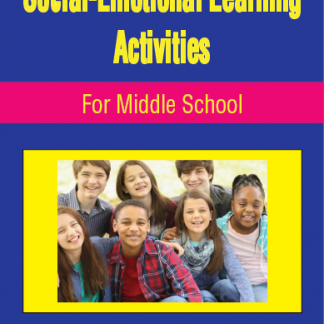
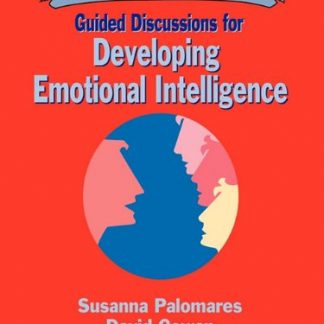
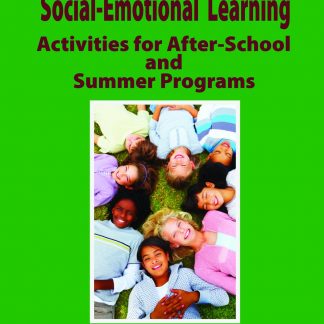
Reviews
There are no reviews yet.